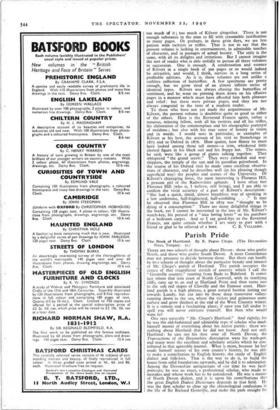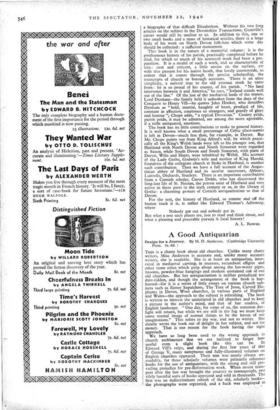Parish Pride.
The Book of Hartland. By R. Pearse Chope. (The Devonshire Press, Torquay. 5s.)
THERE are two schools of thought about Devon : those who prefer North, and those who prefer South Devon. A mere Cornishman may not presume to decide between them. But there can hardly be two schools of thought about the particular beauty and interest of Mr. Chope's parish of Hartland. The parish occupies the centr4 of that magnificent stretch of country which I call the "Grenville country," running from Bude to Bideford. It comes just where that iron coast of North Cornwall, with its terrifying cliffs, runs up to an end at Hartland Point and then turns east to the soft red slopes of Clovelly and the Exmoor coast. Hart- land parish is a high plateau, a great natural bastion jutting out towards Lundy, but cut into by those deep transverse valleys running down to the sea, where the violets and primroses come earliest and grow thickest at the end of the West Country winter. It is a remote and a fascinating place; if once you fall under its spell you will never extricate yourself. But then who would want to?
One says naturally " Mr. Chope's Hartland." And rightly; for he was the old-fashioned and admirable type of scholar who made himself master of everything about his native parish : there was nothing about Hartland that he did not know. And not only Hartland : he cast out his shoe over all North Devon; the Transactions of the Devonshire Association were his wash-pot. and many were the excellent and scholarly articles which he con- tributed to that agreeable journal. What is more, because he had made himself master of his own county's history, he was able to make a "contribution to English history, the study of English dialect and folk-lore. That is the way to do it, to build the house from solid foundations upwards, and he did it to admiration. Among the Devonshire antiquarians of cur time he was facile princeps; he was an exact, a professional scholar, who made no mistakes and whose work has to be considered. He was a master of North Devon dialect, and it is upon his contributions the great English Dialect Dictionary depends in that field. He was the first scholar to clear up the chronological confusions in the life of Sir Richard Grenville, and make the path straight for
that
a biography of that difficult Elizabethan. Without his two long articles on the subject in the Devonshire Transactions, Grenville's career would still be unclear to us. In addition to this, one or two small books and a mass of historical articles, there is a large body of his work on North Devon folk-lore which some day should be collected : a sufficient monument.
This book is in the nature of a memorial volume: it is the posthumous history of his parish, practically completed before he died, for which so much of his scattered work had been a pre- paration. It is a model of such a work, and so characteristic of him : neat and reticent, a little severe on the surface, yet with this passion for his native heath, that lovely countryside, so ardent that it comes through the precise scholarship, the transcripts of church or borough accounts. 'There is an utter simplicity, a naivete true to the old yeoman stock he came from : he is so proud of his county, of his parish. "No land intervenes between it and America," he says, "Ireland stands well out of the line." Of the last of the mediaeval lords of the manor, Lord Dynham—the family held it unbroken from the days of the Conquest to Henry VII—he quotes John Hooker, who describes Dynham as "bold, martial, haughty of heart, prodigal of life, constant in affection, courteous to strangers, and greedy of glory and honour "; Chope adds, "a typical Devonian." County pride, parish pride, it may be admitted, are among the more agreeable, if a trifle antiquated, emotions.
The book has its little contributions to make to general history. It is well known what a small percentage of Celtic place-names is left in Devon—much less than, for example, in Dorset. But Mr. Chope points out from King Alfred's will, by which practi- cally all the King's Welsh lands were left to his younger son, that Hartland with North Devon and North Somerset were regarded as Saxon, while South Devon and South Somerset, with parts of Dorset, Wilts and Hants, were inhabited by Welsh. His account of the Lady Gytha, Godwin's wife and mother of King Harold, foundress of the collegiate church at Stoke in Hartland, is another such contribution. Then we have a full account of the Augus- tinian abbey of Hartland and its secular successors, Abbotts, Luttrells, Orchards, Stucleys. There is an important contribution from a Cornish scholar, Canon Doble, who has discovered the long-lost life of St. Nectan, the patron saint of Hartland and very active in these parts in the sixth century or so, in the library of Gotha : a charming gesture of Cornish antiquarionism to that of Devon.
For the rest, the history of Hartland, so remote and off the beaten track it is, is rather like Edward Thomas's Adlestrop, where
Nobody got out and nobody got in.
But what a rest such places are, just to read and think about, and what a pleasing and peaceable pursuit is local history!
A. L. ROWSE.



























































 Previous page
Previous page